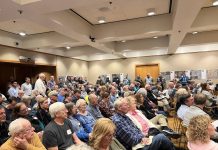The “Angel Man” left a legacy in Columbus.
This fall, Kenny Quick, a Pennsylvania native, moved back to the Orlando, Florida, area, where he lived many years; but in his eight years as a Columbus resident he formed lasting friendships with fellow members of Ogleville Christian Church, fellow volunteers at Love Chapel and the staff at the eastside Walmart, where he stacked bread for Hostess for a while.
He’s also placed angels in the hands of a lot of fellow cancer patients.
Quick has been making and handing out his angel cards since 1998. He prints an angel image multiple times on a sheet of No. 5 card stock, then laminates it and cuts it into individual cards. The back of each card reads, “I will be going out into the world today, so please watch over me.”
He became so well known for his cards in Orlando that he garnered some local media coverage. He continued the practice in Columbus.
“When I have appointments at Columbus Regional Hospital, I give 40 or so to the nurse for her to distribute,” Quick said.
The cards are an expression of the faith that deepened with his own cancer experience. During a two-year period in the late 1990s, he endured two bouts of non-Hodgkin’s lymphoma. It made him more mindful of his relationship with his creator and how he wanted to live.
While Quick has had several occupations throughout his life, his main career has been as an electrician. He’s self-taught, explaining that he’s “not meant for a classroom.”
“The owner of a grocery store I worked for in high school offered to pay my tuition if I wanted to go to college, but I wasn’t interested,” he said.
He moved to Orlando from Pennsylvania in his early 30s, working at Arnold Palmer Children’s Hospital. In the mid-1990s, he met and married his wife, Beverly. It is the second marriage for each.
In January 1997, Quick told his wife that his back really hurt.
“I’d put in two pumps at the hospital that day. I thought I was just sore from that. Then I started getting tired every day. I’d work for a half-hour, and I’d have to get off my feet,” he said.
His doctor did every kind of test you can think of, Quick said.
“By June, I was still trying to find out what was going on because I was just exhausted. At one visit, the doctor’s assistant asked, ‘What’s wrong with your neck? It’s crooked.’ I looked in the mirror, and the side of my neck was all swollen. They told me it was an ear infection.”
Test results were still being processed at that time. The following Monday, his doctor scheduled him for a CAT scan.
“Afterward, the doctor said, ‘There’s no doubt about it; the lymph nodes in your neck are malignant,’” Quick said.
Outpatient surgery to remove them was scheduled, as was chemotherapy and radiation.
“All this happened really quickly,” he said. “There was no time to think it over.”
Quick described the staff at M.D. Anderson Cancer Center, where he underwent his treatment regimen, as wonderful. He has remained in touch with many of them.
“When they heard we were moving back to Florida, they were so excited,” he said.
Quick had been a fitness enthusiast prior to his diagnosis and treatment, but that came to a halt.
“Before cancer, I worked out three to four times a week,” he said. “I was real, real into it. I had my own set of free weights at home. I lost all that during chemo.”
Beverly Quick was the one who saw that he’d need to reintroduce exercise into his life.
“One day, she said, ‘After breakfast, I want you to walk 20 laps.’ She kept after me from then on,” Kenny Quick said.
After chemotherapy and 33 radiation treatments, he was told he was cancer-free. That was not the end of the journey, however.
“I was in the office with two of my bosses when I got the call informing me it had come back,” he said. “I started to cry.”
This time, the tumors were in his abdomen. His doctors prescribed Rituxan, a relatively new drug for treating non-Hodgkin’s lymphoma, having been patented in 1998.
“They gave it to me intravenously,” Quick said. “A nurse sits there with you to find out how fast they can give it to you, because some people had had heart attacks.”
After the Rituxan treatment, he gave himself interferon shots for two years.
“That stuff will knock you in the dirt,” Quick said. “It just wore me out. After a year, I got my doctor to let me reduce the frequency. I finally told him, ‘I’m done. If I die, so be it.’”
He speaks fondly of the people of his neighborhood, who tied a yellow ribbon to a tree in his yard and inscribed it with get-well wishes and assurances of prayers. He looks forward to seeing the ones still in the area during his return to Florida.
He had CAT scans every six months for a while and still has one annually. While he’s had some other health issues, such as pneumonia, cancer hasn’t been one of them.
The “Angel Man,” Beverly and their two dogs (“They’re my babies,” Quick said) planned to return to Columbus this fall — and no doubt widen even further his network of friends.
“Kenny doesn’t know a stranger,” said Margaret King, who, with her husband, first invited Kenny and Beverly to attend Ogleville Christian Church. “He’s always very grateful that God has allowed him a second chance, and that plays out in how he treats other people.”
Quick leaves a lot of people feeling watched over in Columbus and will surely continue paying it forward in the next phase of his life journey.
[sc:pullout-title pullout-title=”Kenny Quick” ][sc:pullout-text-begin]
Age: 71
Resides: Columbus
Type of cancer: Non-Hodgkin’s lymphoma
When diagnosed: 1997
Family: Wife, Beverly.
Advice to those with cancer: “Look to the Almighty.”
[sc:pullout-text-end]




